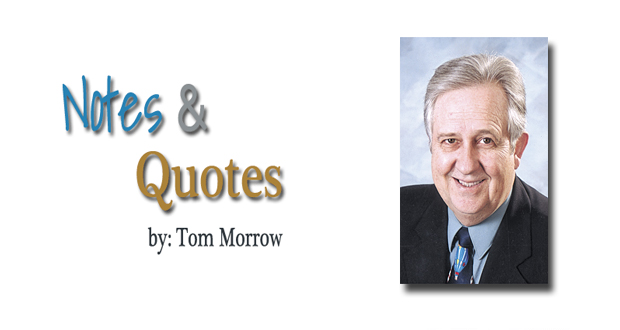CIVICS 101 — Making a Difference
By Tom Morrow
There are a handful of Presidents of the 20th century students of history and civics should get to know in understanding what made America the dominant global nation it is today.

For the most part, today’s young people (those under 40) pay little attention to our history and take for granted America’s position in the world. It was no accident how we got here and understanding how our “democratic republic” works is central.
While today’s President Donald Trump is an easy target for his bombastic style, his isn’t that much different than Theodore “Teddy” Roosevelt, an early 20th century president who found himself in the Oval Office due to the assassination of President William McKinley. Trump’s opponent, former Vice President Joe Biden, could be likened to “Silent” Calvin Coolidge who didn’t talk much … or like William McKinley conducted his entire campaign from his front porch.
Roosevelt, a Republican, believed in a strong Navy. He had the U.S. Navy’s pre-World War I battleships of the “Great White Fleet” circle the globe showing off our growing power. “T.R.” believed in a “Big Stick” policy … as in … “walk softly but carry a big stick.” Having a strong defense is one of Trump’s earmarks.
“T.R.” oversaw the momentous building of the Panama Canal, opening the Atlantic Ocean to the Pacific, cutting in half the time needed to go from ocean to ocean without traveling around the South American horn.

In 1900, the Republicans ran “T.R.” for vice president to get rid of him. As governor of New York, he had been an irritating maverick to old-guard politicians. Their plan backfired when McKinley was assassinated. As president, “T.R.” created havoc on both sides of the congressional aisle and business with a vast variety of needed governmental reforms.
Herbert Hoover was a popular post-World War I humanitarian, but he’s best remembered for being an ineffective president. Hoover was a complicated character, yet an important historical figure. After WWII, he was asked by then-President Harry Truman to organize the feeding of millions of Europeans left homeless and starving in war-torn Europe. While he failed as a president, Hoover’s greatest accomplishment was being that of humanitarian. Hoover gets the brunt of the blame for the thirties Great Depression, the worst economic disaster in world history. During his presidency Truman suggested that “Mr. Hoover didn’t cause the Depression it was created for him.”
Arguably, Franklin D. Roosevelt has been called America’s greatest president. He served more than 12 years, guiding the nation through the dark years of the Depression and most of the five years of World War II. Dozens of books have been written on “FDR,” making his presidency a pivotal time in the last century.
However, probably one of our best presidents was Truman, whom I talked about recently. Known among detractors as “His Accidency,” he became president when Roosevelt died a few weeks into his fourth term. Truman moved into the White House and became the only high school graduate of the century to become president.

Ironically, “FDR” never had confided in Truman about the atomic bomb. He wasnn’t told about the highly-secret $2 billion World War II project until after assuming office. Truman had to make the momentous decision to drop the two devastating bombs on Japan. It was the most important of the century’s decisions any head-of-state ever made. An estimated half-million U.S. troops and as many as 1.5 million Japanese were saved from death that, if the war had continued, most likely would have occurred in assaulting the main island of Japan.
Some five years after WWII, the so-called “Cold War” began and lasted for more than 40 years until Ronald Reagan built up American armed forces to the point it caused the Soviet Union to go broke trying to keep up. The accomplishments of presidents Dwight D. Eisenhower and John F. Kennedy led us through the turbulent 50s and into the 60s. It was “Ike” who was the architect of our Interstate highway system, and Kennedy who launched us to the moon with our space program. How did they get the money for those programs?
Kennedy and his vice president, Lyndon Johnson, changed America with meaningful civil rights. All tough questions for Congress to ponder when advising and giving its consent to the president.
For those who are bored with or lacking in knowledge of our history and a basic understanding of American civics, may I suggest studying the aforementioned presidents. It might help whet the appetite for the necessary ingredients to being a knowledgeable and informed citizen. A quick study of the “electoral” college for this week’s presidential election will no doubt be helpful in understanding it … isn’t always who gets the most popular votes, but at least or more than 270 “electoral” votes … just ask Al Gore or Hillary Clinton.




